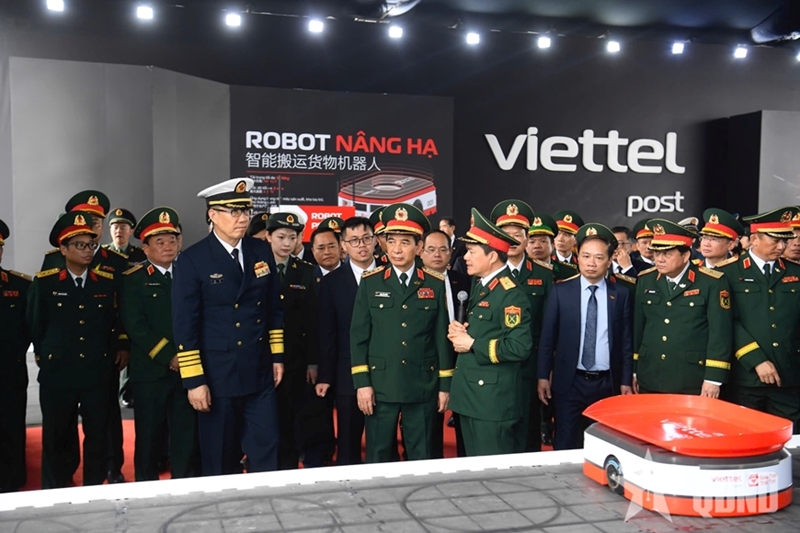The global situation is evolving with great complexity across many domains such as politics, economy, defense, security, and beyond. Competition among major powers is intensifying on all fronts. Armed conflicts are not confined to one region but erupting in multiple parts of the world, with the emergence of proxy wars and highly unpredictable forms of hi-tech warfare. Meanwhile, climate change, pandemics, and non-traditional security issues remain acute.
This raises the question: What should be the major tasks of defense diplomacy in such a context?
    |
 |
|
Defense Miniser General Phan Van Giang and his Chinese counterpart Dong Jun visit Viettel Logistics Park in Lang Son during the ninth Vietnam - China Border Defense Friendship Exchange, April 2025. |
First and foremost, defense diplomacy must thoroughly grasp the viewpoints and policies of the Party, particularly the recent resolutions, especially those adopted at the eighth session of the 13th Party Central Committee on the strategy for national defense in the new situation, along with resolutions of the Central Military Commission and directives from the Ministry of National Defense leadership. Every cadre, Party member, specialized agency, and officer directly engaged in defense diplomacy must fully understand these guidelines, internalize them, and translate determination into specific action with absolute faith in the Party’s leadership.
In the current situation, bilateral defense cooperation can be considered the core of defense diplomacy, as it contributes to building political trust. Strengthening bilateral defense ties with other countries also opens up opportunities for our military to build a contingent of capable, high-caliber officers, and to accelerate the development of military science and technology, contributing to the military’s modernization while learning from partners in organization and training. However, every cooperative activity must be carefully prepared in content and innovative in method to maximize effectiveness.
Meanwhile, multilateral defense diplomacy, particularly multilateral forums, remains an important channel to affirm our Party, State, and military’s stance on safeguarding independence, sovereignty, and territorial integrity, and resolving disputes through peaceful means, dialogue, and international law.
Advancing multilateral defense diplomacy also helps the world better understand Vietnam, its people, and the heroic, resilient, loyal, peace-loving, and internationally responsible Vietnam People’s Army. This has been clearly demonstrated in our participation in U.N. peacekeeping operations and international humanitarian assistance and disaster relief missions.
It is also essential to clearly define the key “content” of defense diplomacy since protocol, while important and necessary, is not decisive factor. With each partner or counterpart, it is critical to determine precisely how to cooperate and how to struggle in order to develop the most effective diplomatic strategy. Following the teaching of President Ho Chi Minh that “Firm in objectives, flexible in strategies and tactics,” each defense diplomacy engagement should be viewed as a “battle without gunfire,” with well-calculated objectives and outcomes.
Defense diplomacy institutions and specialized cadres must uphold unity and consensus to overcome difficulties and challenges, for “one tree alone cannot make a hill, but three trees together can form a mountain.” There must also be stronger linkage, coordination, and synchronization between defense diplomacy agencies and other relevant agencies and units. For work to be smooth and effective, these agencies would directly give advice, conduct inspection and urge relevant agencies and units rather than relying solely on paperwork and correspondence.
To this end, this requires thorough preparation, first and foremost in terms of personnel. Defense diplomacy today requires a team of cadres with strong political stance, intelligence, experience, daring to think, daring to do, foresight and proposals of multiple courses of action for each activity or event. Therefore, in selecting personnel for defense diplomacy, one must avoid the tendency of accommodating individuals who lack capability, which could lead to the situation of “having people, but work does not move.”
Defense diplomacy now faces hard and complex tasks to meet the real requirements of the nation in its new era. Yet we, the earlier generation, firmly believe that with capability, determination, and the spirit of continuous self-improvement, today’s comrades and colleagues working in defense diplomacy will certainly fulfill their entrusted missions.
By Nguyen Ly
Translated by Mai Huong